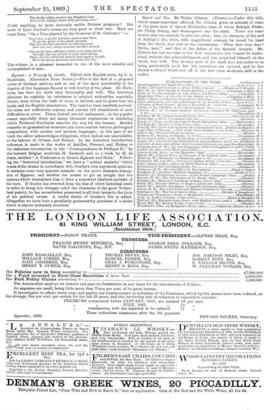Egmont : a Tragedy by Goethe. Edited with English notes,
by C. A. Bnchheim. (Clarendon Press Series.)—This is the first of a proposed series of German authors, and as one of the most noteworthy of the classics of that language Egmont is well worthy of the place. Dr. Buch- heim has done his work very thoroughly and well. The historical allusions he explains by references to original authorities, especially Strada, from whom the bulk of them is derived, and he gives both the Latin and the English translations. The text has been carefully revised; the notes are sufficiently copious, and contain full elucidations of such difficulties as occur. These, indeed, are not unfrequent ; in the popular scenes especially there are many idiomatic expressions in rendering which Professor Buchheim smooths the way for the learner. Besides remarks on grammatical structure, the notes contain various philological comparisons with ancient and modern languages ; in this part of his work the editor acknowledges obligations, which indeed are unavoidable, to the labours of Grimm and Becker. In the historical introduction reference is made to the works of Schiller, Prescott, and Motley, to the elaborate introduction to the "Correspondence de Philippe II.," by the learned Belgian archivist, M. Gachard, and to a work by M. de Juste, entitled "A Vindication of Counts Egmont and Horn." Follow- ing the "historical introduction," we have a "critical analysis," which treats of the drama in accordance with Goethe's own expressed opinions. It contains some very apposite remarks on the poet's dramatic concep- tion of Egmont, and enables the reader to get an insight into the reasons which determined him to draw a somewhat idealized portrait of his hero. If Goethe has swerved from the line of strict historical truth in order to bring into stronger relief the character of the great Nether- land patriot, he has nevertheless preserved in all their integrity the facts of his political career. A useful sketch of Goethe's life is added. Altogether we have here a peculiarly praiseworthy specimen of a series which is almost uniformly excellent.






























 Previous page
Previous page